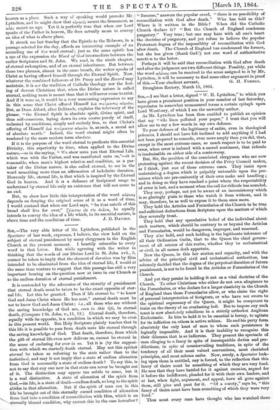Stn,—The very able letter of Mr. Lyttelton, published in the
Spectator of last week, expresses, I believe, the view held on the subject of eternal punishment by many clergymen in the English Church at the present moment. I heartily subscribe to every word in that letter. But while agreeing with the writer in thinking that the words of our Divine Lord in St. John xvii., 3, cannot be taken to imply that the element of duration was by Him intended to be eliminated from the idea of eternal life, I would at the same time venture to suggest that this passage has still a very important bearing on the question now at issue in our Church as to the endless duration of eternal punishment.
It is contended by the advocates of the eternity of punishment that eternal death must be taken to be the exact opposite of eter- nal life. Let this be granted. Then if life eternal be " to know God and Jesus Christ whom He has sent," eternal death must be not to know God and Jesus Christ; i.e., all those who are without the saving knowledge of God are, even in this life, in eternal death, (Compare 1 St. John. v., 11, 12.) Eternal death, therefore, equally with its opposite, is a condition in which we may be even in this present world. But Holy Scripture plainly teaches that in this life it is possible to pass from death unto life eternal through the saving knowledge of God. That death, therefore, from which the gift of eternal life even now delivers us, cannot be eternal in the sense of enduring for ever in us. Yet it is (by the supposi- tion with which we started) death eternal. May not this epithet eternal be taken as referring to the state rather than to the individual, and may it not imply that a state of endless alienation from God is necessarily a state of endless death? To say this, is not to say that any one now in that state can never be brought out of it. The distinction may appear too subtle to some, but it is •a real distinction. A state of alienation of the spirit from God,—its life, is a state of death—endless death, so long is the spirit abides in that alienation. But if the spirit of man can in this life be brought out of this eternally cursed condition of alienation from God into a condition of reconciliation with Him, which is an eternally blessed condition, why cannot this be the case hereafter?
" Because," answers the popular creed, " there is no possibility of reconciliation with God after death." Who has told us this? Where is it written in the Bible ? When did the Catholic Church declare it? " But the Church of England condemns purgatory." Very true ; but one may hate with all one's heart the doctrine of purgatory, and yet refuse to believe the popular Protestant dogma of the impossiblity of reconciliation with God after death. The Church of England has condemned the former, but she has given (thank God !) not one word of authoritative' sanction to the latter.
Perhaps it will be said that reconciliation with God after death and after the judgment are two different things. Possibly, yet while the word ato5yroc can be received in the sense assigned to it by Mr. Lyttelton, it will be necessary to find some other argument in proof
of this.—Your obedient servant, G. H. FORBES. Broughton Rectory, March 15, 1864.


































 Previous page
Previous page